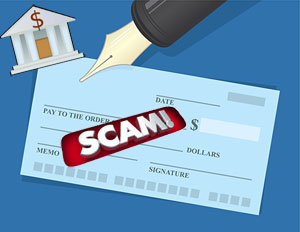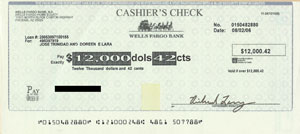CASHIER'S CHECK SCAM
WHAT IS CASHIER'S CHECK SCAM ?
A cashier's check is a type of check issued by a bank or credit union and signed by a cashier or teller. Because the funds are drawn directly against the issuing bank's cash reserves, the checks cannot bounce. The cashier's signature on the checks represents payment guarantee.
We may also receive a cashier's check after closing a deposit account that still has money in it. Although cashier's checks cannot bounce, they are nonetheless vulnerable to other dangers such as theft or fraud. And it's not easy to deal with either problem. Cashier's checks have a reputation for being safe, and that's what makes them perfect for scams. Whether you're selling something online or in-person, cashier's checks deserve extra attention.
A check that is written by a bank or credit union and is signed by a teller or cashier is known as a cashier's check. The checks cannot bounce since the money is taken directly out of the issuing bank's cash reserves. The cheques' cashier's signature serves as a guarantee of payment. When we close a bank account with money in it, we could also get a cashier's check. Despite the fact that cashier's checks cannot bounce, they are nonetheless susceptible to other risks including theft and fraud. And solving either issue is difficult. Cashier's checks are ideal for frauds because of their reputation for being secure. Cashier's checks need special consideration whether you're selling anything offline or online.

SAFETY AND CASHIER'S CHECK FRAUD :
Cashier's checks are regarded as secure since they provide guaranteed funds when they are valid. A personal check won't bounce, and the funds are often ready for use within one business day, so the recipient doesn't have to worry. Unfortunately, cashier's checks are not as secure as they formerly were. You cannot just presume that a cashier's check is equivalent to cash if you do not know and trust your customer.
Cashier's checks are regarded as secure since they provide guaranteed funds when they are valid. A personal check won't bounce, and the funds are often ready for use within one business day, so the recipient doesn't have to worry. Unfortunately, cashier's checks are not as secure as they formerly were. You cannot just presume that a cashier's check is equivalent to cash if you do not know and trust your customer.
A TYPICAL CASHIER'S CHECK SCAM :
The most common cashier's check scam goes something like this: A "buyer" wants to purchase a product and will use a cashier's check. For whatever reason, the buyer has a check issued for an amount in excess of the purchase price. Still, the buyer wants the seller to "just go ahead" and deposit the check. Finally, the buyer requests that the seller return the excess money, typically in cash, by wire transfer. The return payment might go directly back to the buyer or to a third party.
A "buyer" wants to buy a goods and will use a cashier's check to do so, according to the most typical cashier's check scam. The buyer, for whatever reason, has a check written out for more money than was paid for the item. The buyer still requests that the seller "just go ahead" and deposit the cheque. The buyer then asks the seller to wire them the extra cash, which is normally returned. The buyer may get the refund money directly or it may go to a third party.

NOTE THE KEY ELEMENTS :
? The seller or recipient gets a check for more than they asked for.
? The seller is supposed to send the extra money back to the buyer or to a "helper." If you're faced with a situation that looks anything like this, you're almost certainly dealing with a thief.
? TIMING IS ESSENTIAL : Don't send any money or merchandise until you are 100 percent certain that the paying bank has actually sent the funds. This is often referred to as the time when the check "clears," but that term can be confusing?even for bank employees.
Funds from a cashier's check will be available to you for withdrawal within one business day, but that doesn't mean that the funds actually exist or that they moved to your bank. That process can take several business days or longer. The less you know about your buyer, the longer you should wait.
HOW CASHIER'S CHECK BOUNCE ?
Everyone believes that cashier's checks are secure, which makes these schemes effective. You might need to replenish the funds if you spend that money (by sending it to a "shipper," for example). When your bank realizes the check is fake, the deposit will be revoked, which can result in a negative account balance for you. You'll wind up bouncing checks and failing to make other crucial payments if your bank account is empty. In addition, those who fall for these scams may lose hundreds or even thousands of dollars.
Everyone believes that cashier's checks are secure, which makes these schemes effective. You might need to replenish the funds if you spend that money (by sending it to a "shipper," for example). When your bank realizes the check is fake, the deposit will be revoked, which can result in a negative account balance for you. You'll wind up bouncing checks and failing to make other crucial payments if your bank account is empty. In addition, those who fall for these scams may lose hundreds or even thousands of dollars.

PROTECT YOURSELF :
? If possible, go to the bank with whoever is paying you and watch them get the cashier's check from a teller.
? Verify funds on any check or money order you receive.
? Insist on other forms of payment that you know are more reliable (such as a wire transfer) but be careful about giving out your bank account information.
? Only deal with local buyers on Craigslist and similar sites, and insist on cash payments if you can't go to the bank together.
? Inspect any check you receive, looking for signs that it's a fake. Misspelled words and poor quality paper without any security features are common on fake checks.
? If you must take a check for more than your asking price, inform the seller that you'll wait at least two weeks before sending any money or sending merchandise.
? Speak with a bank manager when you deposit suspect checks. Explain the situation and your concerns, and ask when you can be 100 percent certain that the payment is good. Better yet, don't accept suspect checks.
MORE EXAMPLES :
* Money mule : You receive payments, and you're supposed to deposit the payments to your account and forward the money to somebody else. Often advertised as a work-at-home check processing job, these schemes are usually problematic. In some cases, you're laundering money for criminals. In other cases, the first few payments are fine, but eventually, you'll get a fake check (after they've gained your trust) and you'll lose money.

* Foreign wealth scams : Someone who you don't know contacts you and requests for your assistance in transporting a sizable quantity of money out of a corrupt country. You get to keep a modest portion of the transfer in return, which is more cash than you make in a year. Naturally, you'll need to transfer money to another party in order to finalize the transfer.
* Inheritance and lottery scams : You won! You're about to receive a lot of money, but you'll need to pay a small amount for taxes or legal fees to "release" the funds. It's a small price to pay for the riches that are headed your way. Of course, they'll never materialize.

* Property rental scam : For a new job, someone is relocating to your region. They would want to use a cashier's check to pay the security deposit, the first and final month's rent, and other associated fees. The property is something they have never ever seen. They claim there was a problem with the job and that they no longer require the rental the day after you pay the money since they won't be arriving. While they would like for you to refund some of the rent, you are allowed to keep the security deposit. You'll discover that the cheque was a forgery after sending the reimbursement.

Feel Free to use our Spam Checker Tool
Report scam to United States government-you could file a complaint about scam or other crime here.



